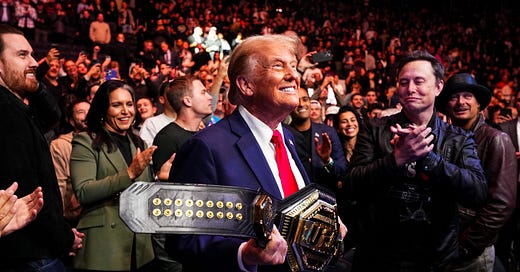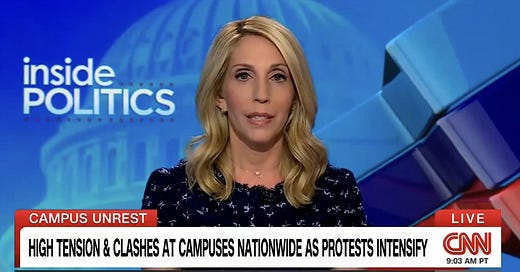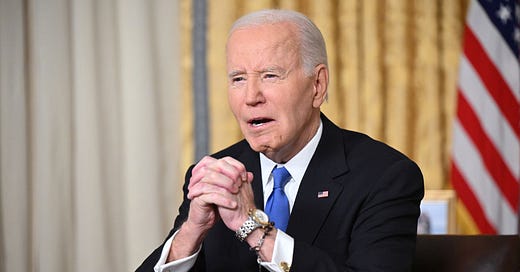
There is a common trope about people who only understand strength. It crops up in fiction and history — the warlord who only understands violence, the businessman who only understands wealth and riches. In the real world things are mostly more nuanced, of course, but the core of truth within that cliche is that power is something people immediately understand. We do not like feeling powerless and we love to feel powerful. It is hardwired in us by both evolution and shitty pop culture: the strong survive, and we want to feel strong.
I keep coming back to this because I’m convinced at this point that it’s really all you need to know about the second Donald Trump administration. It’s kind of all you needed to know about the first one, too, but I think we hadn’t been beaten over the head with the conditions that led us there yet and can be sort of forgiven for losing the plot for a decade or so during the Obama years. Now, though: it’s about power. This is not hard.
What Donald Trump does best, what his brutal version of the conservative movement does best, is convince people that if they support it they will have power. You could argue that this is, or should be, at the core of every political movement, but for some reason in the mid-2010s apex of confusingly means-tested and sufficiently-bylawed liberal governance, we sort of lost the fact that in order to make democracy work you have to convince people that their vote is going to get them something more tangible than an abstract ideal like “democracy” or control of a shoddily-understood institution like the Supreme Court. In 2016 Donald Trump waddled up to a microphone and said “No taxes and you get your job back.” For a lot of people — not just stupid people lost in all the flim flam of Trumpism, normal people who maybe just don’t read a lot of like Slate dot com or whatever — that was it. That’s all it took.
He lost in 2020, as I said immediately following our most recent election, because the Democrats were able to pin all of the fucked-up stuff that happened under his presidency — COVID, mostly — on him. That worked, but then, like during Donald Trump’s presidency, things didn’t get that much better. Stuff not completely in Joe Biden’s control happened — the price of eggs and gas going sky high, a suicide bomb at the gates of a military base in Kabul crammed with troops and refugees, the literal deterioration of his brain on national TV — but despite the Biden administration’s real legislative victories, the tangible material conditions in this country didn’t change all that much for a whole lot of people. The result, like the leadup to 2016, was a country feeling both an existential malaise and some real economic pain, with a presidential candidate who, once again, showed up and said “fuck that, I’ll fix it.” The Harris campaign couldn’t offer the same, and didn’t offer the same. They got close in some ways — their pitch to save reproductive rights was both urgent and persuasive — but it wasn’t enough. Donald Trump made people feel powerful when they were scared. The Democrats just made people feel more scared.
This all kind of crystallized for me this past weekend, when I was at the UFC event at Madison Square Garden on a reporting assignment. Trump showed up, as you’ve probably seen by now, dragging his whole new entourage: Elon Musk, Tulsi Gabbard, RFK Jr., even Speaker of the House Mike Johnson. I don’t want to spike my own quotes here so I’ll paraphrase, but sometime after the 10-minute standing ovation from a roaring crowd, a kid who actually turned out to be Canadian put it pretty simply: he said he felt “hope” when he saw Trump walk out to the Octagon. He felt like there was a guy who liked the things he liked and would fight for him, and that being in that arena and supporting that guy gave him power.
I know that this is simplistic. People are smarter and more nuanced and care about many many things and millions of them in this country really did feel quite inspired by the Harris-Walz campaign’s message. But it clearly — so incredibly clearly — was not enough. Maybe the next four years are so awful and brutal that the Democrats win one more election on the “let’s go back to normal” pitch. It’s a decent line. But if that’s the centerpiece of their campaign, the centerpiece of their movement, boy, I don’t know. The “normal” that they’re pitching isn’t really that good for a lot of people. For many others, it outright sucks. And years and years and years of this just not changing has shown the American people how little power they actually have, so much so that many of them are just waiting for someone, anyone, to come along and tell them that for the low price of a vote, they can get some of it back — and crucially, get some things that they want out of it.
That’s what power is all about: security, money, freedom, better things. Over the next four years we will see all of those things stripped from millions of people who need them the most. The fix to that isn’t promising that normality will resume or the country will move forward, whatever that means. It’s coming to people and offering up something big and concrete and powerful: health insurance, wiping debt, giving them houses, giving them jobs, giving them ways to contribute and succeed and thrive again, and not beating them up for the mistakes they may or may not have made in the past. You can do this without offering the dark, punishing version of America that Donald Trump offers, but you have to offer them something. Loyal Democrats will say that’s what they do, but after this month, it’s pretty clear that they failed. If they hadn’t, they’d still be in power.

















"The “normal” that they’re pitching isn’t really that good for a lot of people. For many others, it outright sucks."
This drove me *crazy* in 2020. Nobody wanted normal! That's why we got trump in the first place!
I'm going to keep saying this over and over, because it keeps getting glossed over: Trump got the same number of votes in 2024 as he did in 2020. 74 million. He's *not* more popular now. There's a narrative push to say he "won" groups, when what happened was fewer members of those groups voted: young people, Latino men, etc.
The people excited about a Trump Presidency are pretty much the same people who have been excited about a Trump Presidency for 12+ years, with just enough new blood to replace those who died in the last 4 years. I am concerned to see Discourse parroting this narrative that he's suddenly more popular/a new hope, which is being used in media to manufacture consent and discourage dissent.